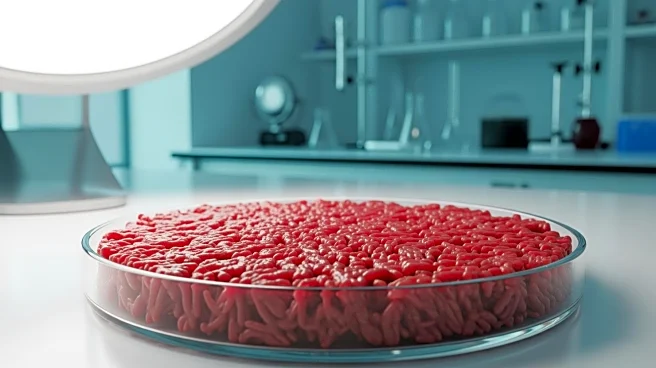What's Happening?
Israeli scientists from the Hebrew University of Jerusalem, in collaboration with Believer Meats, have announced a significant breakthrough in the cultivated meat industry. They have successfully induced unlimited cell division in beef cells without genetic
modification or cancerous transformation, a process known as 'cellular immortality.' This discovery addresses a major hurdle in the industrial-scale production of cultured beef, potentially making it more accessible and affordable. The research, published in Nature Food, positions Israel as a leader in alternative protein development, challenging previous assumptions that stable bovine cell lines required genetic engineering.
Why It's Important?
The ability to produce stable, non-GMO cell lines for cultivated meat is crucial for overcoming regulatory and economic barriers. Many global food safety authorities require cultured meat to be derived from non-genetically modified cells, and this breakthrough could streamline approval processes, especially in regions with strict regulations like Europe. Additionally, stable cell lines enable continuous, large-scale production, reducing costs and making lab-grown meat more viable for mass-market consumption. This development aligns with global efforts to enhance food security and sustainability, as cultivated meat is seen as a strategic solution to these challenges.
What's Next?
The Israeli breakthrough could accelerate the commercialization of cultivated beef, potentially influencing regulatory frameworks worldwide. As governments increasingly prioritize alternative proteins, this discovery may prompt further investments and collaborations in the food-tech sector. In Europe, where approval processes are lengthy, innovations like 'immortal' cell lines could shift the balance and boost the development of cultivated meat solutions. The global cultivated meat industry may see increased competition and innovation as companies strive to capitalize on this new technology.
Beyond the Headlines
This breakthrough offers a more 'natural' approach to cultivated meat production, contrasting with methods that rely on genetic engineering. It echoes challenges faced by other industries, such as antibiotics and renewable energy, where high costs and limited production capacity initially hindered progress. The development of stable bovine cell lines could revolutionize the production of muscle and fat tissues, reducing the need for resource-intensive cattle farming and its associated environmental impacts.














